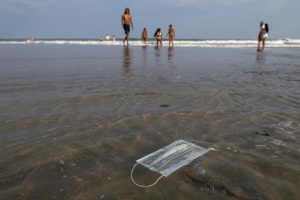NEW JERSEY’S WILDLIFE IN THE TIME OF COVID-19 – PART 4
by Milena Bimpong
This story marks Part 4 of CWF’s series about COVID-19’s impacts on nature in New Jersey and beyond. Part 1 can be found here, Part 2 can be found here, and Part 3 can be found here. CWF Executive Director David Wheeler discussed COVID-19 and wildlife on our podcast, State of Change, which can be found here.
Less Air Pollution & More Plastic Pollution

This year, the COVID-19 pandemic has affected human lives in many different ways. However, the pandemic has been impacting our environment and nature as well. For example, air pollution decreased when people started staying inside due to lockdown restrictions, which is beneficial towards wildlife. However, there have been negative impacts as well. The amount of debris in marine ecosystems has increased due to improper disposal of face masks. What will the future for wildlife species in New Jersey look like amid the pandemic?
One temporary positive impact that the pandemic has had on the environment is reduced carbon dioxide emissions. According to a study published in Nature Climate Change, global carbon dioxide emissions have decreased by 17% from 2019 to early April 2020. Although this won’t last once we return to pre-pandemic conditions, reduced carbon dioxide emissions is great for wildlife. Since too much carbon dioxide in the atmosphere has amplified the effects of climate change, this has threatened the habitats of many wildlife species. If reduced carbon dioxide emissions were to occur long-term, it would be able to have a larger impact on wildlife habitats.
On the flip side, the pandemic may have a negative impact on marine biodiversity due to plastic pollution. The production of face masks, hand sanitizer, and PPE require a significant amount of plastic. A particular issue with face masks is improper disposal: littering, especially near beaches, is an easy way for face masks to get into the ocean. Face masks often consist of polypropylene and polyethylene, and sometimes polyurethane and polyacrylonitrile.
Once these substances end up in marine ecosystems, they will break down into microplastics which can then injure or even kill marine wildlife. Also, the strings attached to face masks pose as a potential choking hazard for marine wildlife. While it’s crucial to wear face coverings throughout this time, it’s also important to dispose of them properly in trash bins. Additionally, reusable masks are an environmentally-friendly alternative.

Overall, COVID-19 not only affects us, but also our environment and wildlife. It’s important to be conscious of the choices that we make, so that we keep ourselves and New Jersey’s wildlife species safe during the pandemic.
Sources
- https://bioone.org/journals/wildlife-biology/volume-2020/issue-2/wlb.00727/How-conservation-will-be-impacted-in-the-COVID-19-pandemic/10.2981/wlb.00727.pdf
- https://www.nature.com/articles/s41558-020-0797-x
- https://www.nwf.org/Our-Work/Environmental-Threats/Climate-Change/Greenhouse-Gases
- https://www.sciencedirect.com/science/article/pii/S0048969720340870
- https://earth.org/covid-19-surge-in-plastic-pollution/
Discover more from Conserve Wildlife Foundation of NJ
Subscribe to get the latest posts sent to your email.